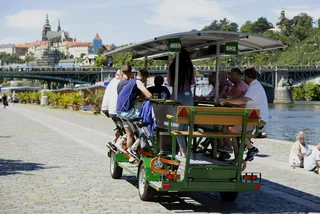Prague and shared bike service operators have agreed on new rules. The Prague City Council approved a memorandum that defines locations where it will not be possible to drop off shared bicycles, among other changes.
The newly approved memorandum will replace the original one from 2018, which no longer meets current requirements. The new rules only apply to bikes. The memorandum does not cover electric scooters. The city will also start to examine whether bike-share operators can be charged fees for parking on sidewalks.
“One of the points of the memorandum is to define locations where parking shared bikes will not be allowed, so as not to cause interference. Operators must also work closely with the districts, maintain a list of bikes, and operate a contact point or phone line where Prague residents or colleagues from the districts can address any problems,” Prague Deputy Mayor Adam Scheinherr, responsible for transport, said.
“Part of the memorandum, for example, defines deadlines for dealing with requests to remove badly parked or broken bicycles, and introduces a mechanism for fining bike-share users who break the rules,” Scheinherr added.
The memorandum is aimed at creating mutually accepted conditions between the bike companies and the city for operating the shared bike service.
The city developed the new memorandum from the beginning with the bike-sharing operators. The Municipal Police and the Prague 1 and Prague 10 districts, where the service is most common, also commented on the draft. Some of the comments were subsequently incorporated, and the bike-sharing companies accepted them and agreed to sign the memorandum.
One new point defines locations where shared bike parking will not be allowed. Significant locations across the city were defined based on the requirements of the Czech Police in terms of their interest in providing protection. In addition, parks and gardens of citywide significance have been added with an aim of restricting the storage of shared bikes within protected recreational areas. Similar requirements may then be added by individual districts.
Bike-sharing operators will have to submit an operating plan in advance, which will be discussed with the municipalities concerned. The capital will ask individual district mayors to provide information on the conclusions of their mutual negotiations and on their ongoing experience with the operators so that Prague can continuously evaluate the level of cooperation and the effectiveness of the memorandum.
The approval of the document will cancel the original memorandum concluded in 2018, which was more general. Some of its points proved to be unworkable. At the same time, given the problems with electric scooters, which even their operators are not able to solve, the new memorandum is intended only for bicycle operators, City Hall said.
The memorandum also tasks the city’s Department of Taxes, Fees, and Prices to examine ways of charging the operators of shared bikes and scooters for using public spaces. So far the city has followed guidelines from the Czech Ministry of Finance, which applies rules for the general use of roads to parking bicycles and scooters on the sidewalk. This is free of charge by law.
However, the Czech Interior Ministry has recently allowed the City of Hradec Králové to insert charges for street parking of bikes and scooters into its ordinance. Prague City Hall wants to examine the situation and the possibility of introducing similar fees.
Prague City Hall counts on shared bikes as part of its solution to reducing car traffic in the city.
Last month, the city approved a project that allows holders of Lítačka public transport pass to have access to use shared bicycles from the Rekola and Nextbike companies for time intervals of up to 15-minute time periods, up to four times a day, free of charge.












 Reading time: 3 minutes
Reading time: 3 minutes 




























